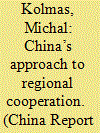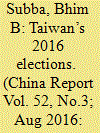| Srl | Item |
| 1 |
ID:
146895


|
|
|
|
|
| Summary/Abstract |
China’s rise has inspired a variety of interpretations arguing for either its potentially disruptive or alternatively its benign impact on Asia–Pacific security. This article aims to contribute to this debate. It focuses on the upsurge in Beijing’s multilateral diplomacy since the beginning of the 1990s, which has been reflected in China’s willingness to take part in many regional institutions, such as Shanghai Cooperation Organization (SCO), the Six Party Talks (6PT), East Asia Summit (EAS) or Asia Pacific Economic Cooperation (APEC). But what are China’s motivations for participation in these institutions? Are they instrumental, driven by pragmatic self-interest, or moral, driven by normative values of peace? Or, has China merely accepted the need to play a socially ‘appropriate’ role within the region? The article offers a theoretically informed typology of the different kinds of motivation that can explain China’s multilateral diplomacy in the last three decades. It argues that whereas social motivation played a decisive part in the first phase of China’s multilateralism, instrumental motivation can be seen as defining the more recent phase.
|
|
|
|
|
|
|
|
|
|
|
|
|
|
|
|
| 2 |
ID:
146897


|
|
|
|
|
| Summary/Abstract |
This year the National People’s Congress (NPC), supreme legislative body of China, held the 4th plenary session of the 12th NPC from 5 to 16 March 2016. Simultaneously, the pre-eminent advisory body, China People’s Political Consultative Conference (CPPCC), the upper house in its parliament, also met. This year the NPC’s fourth session was engaged in a varied and serious law making process wherein the legislative business included among other matters the approval of the key 13th Five Year plan of China for the next five years from 2016 to 2020. The NPC as an institution plays a key role in the law making process of China and its composition in terms of members provides authenticity to the law making process in China. This commentary is mainly concerned with the NPC session keeping in mind the aforesaid pointers.
|
|
|
|
|
|
|
|
|
|
|
|
|
|
|
|
| 3 |
ID:
146894


|
|
|
|
|
| Summary/Abstract |
The hard logic of China’s geostrategic vulnerability drives Chinese foreign policy. Neither nationalism, power struggles nor interest group politics constrain the elite’s foreign policy decisions. The good news for India is that China’s goals are relatively easy to understand. The bad news is that China seeks more influence in South Asia.
|
|
|
|
|
|
|
|
|
|
|
|
|
|
|
|
| 4 |
ID:
146898


|
|
|
|
|
| Summary/Abstract |
Each year, the National Development and Reform Commission (NDRC), China’s apex body to administer the financial planning and development, prepares and submits the work report to its mentor - the State Council. This year’s work report hold a peculiar significance as it was the last in the series of 12th Five Year Plan. The report highlighted the major milestones the Chinese economy achieved so far in 2015 and also discussed the future course of economic manoeuvre during the 13th Five Year plan. Although, historically as well as principally, the work reports by NDRC or its predecessor State Planning Commission and State Development Planning Commission were more ceremonial and far from self-diagnostic, there is a makeover underway especially the way the reports have been projected. The recent reports, which are tabled in the wake of economic slow-down, take reflective positions than earlier reports. However, this can be perceived as a thoughtful position by leaders and not an agent of any depressive or progressive tendencies.
|
|
|
|
|
|
|
|
|
|
|
|
|
|
|
|
| 5 |
ID:
146896


|
|
|
|
|
| Summary/Abstract |
This article examines the recent Presidential and Legislative Yuan (LY, 立法院) elections in Taiwan. The Democratic Progressive Party (DPP) swept elections at both levels. Its candidate was elected as the island’s first female president. On the other hand, the ruling Kuomintang (KMT) lost its majority in the legislature for the first time since competitive electoral democracy began in Taiwan. These elections saw a change in the agenda of the major parties, especially that of the DPP, on various domestic and external issues. At the same time, the growth of student and civil society movements and their participation in the political arena since the 2014 Sunflower movement have carved out a niche in Taiwanese politics today. This article offers some preliminary comments on the significance and impact of the elections on Taiwan’s changing domestic and political landscape, with the emergence of new political forces and socio-economic challenges, along with nebulous Cross–Strait relations and ‘shrinking’ international space and diplomacy. How TsaiIng-wen’s administration after 20 May will deal with these intricate issues will be a test for her presidency.
|
|
|
|
|
|
|
|
|
|
|
|
|
|
|
|